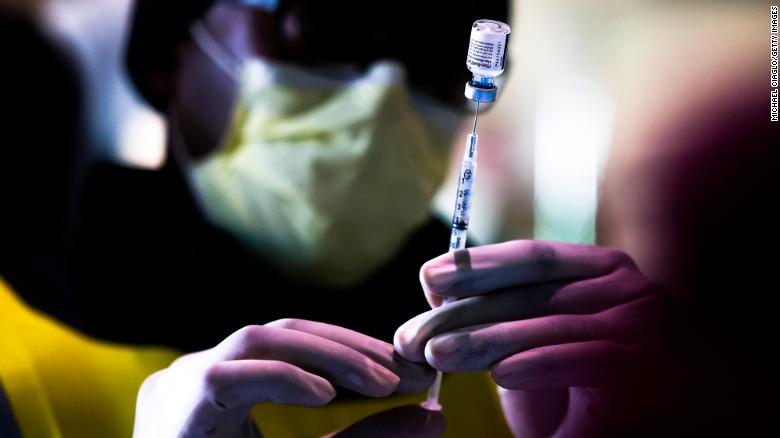Biden: More than 527,700 deaths from covid-19 in the US 4:48
(CNN) -
Covid-19 numbers appear to be declining in the United States after a year of collective pain.
But tens of thousands of deaths are expected in the coming months, and experts warn that Americans must not let their guard down just yet.
"I think we're kidding ourselves," Dr. Paul Offit, director of the Center for Vaccine Education at Children's Hospital of Philadelphia, said Thursday.
"I think what is going to happen is that they will see that as we enter the summer months, the numbers will go down, people will think great, we are fine."
"And then if we don't get to what I think will be at least 80% immunity of the population against natural infection or immunization, when winter comes, you will see an increase again," he added.
Over the past seven days, the US has averaged 56,240 new cases per day, the lowest number since mid-October, and 1,437 deaths per day, which is the lowest number in the country since November 19.
But if current policies remain in place, about 23,000 more people could die from the virus in April, according to a projection from the Institute for Health Metrics and Evaluation (IHME).
advertising
However, many states have begun to relax measures, including mask-wearing mandates.
And because there are fewer face masks and more people moving around with more transmissible variants, the IHME raised its prediction of covid-19 deaths for July 1 by an additional 22,000 people.
In total, the IHME predicts nearly 600,000 deaths from covid-19 by July 1, up from the current number of around 530,000 recorded deaths.
What is done next in the United States could affect the trajectory of the pandemic, said the director of the Centers for Disease Control and Prevention (CDC), Rochelle Walensky, in an interview with NBC Nightly News. .
"I think March and April are very important and critical times," he said.
“For one thing, you have this hyper-transmissible virus that could result in another surge after spring break.
"On the other hand, we are increasing the rate of vaccination very fast, and what we really want to do is simply give those vaccines a fighting chance to win and not let this virus emerge again."
'We have to be humble in the face of this virus'
For those who are already vaccinated, the CDC released new guidelines Monday, keeping the travel recommendations.
Some question whether the guidelines are too strict.
"We have to be humble about this virus," Walensky said in the interview with NBC Nightly News.
"Every time we felt we had it under control, we had a huge increase."
Once more people are vaccinated and case numbers drop, the CDC could revise its guidance, Walensky said.
A year after much of the country was shut down by the virus, more than 98 million doses of covid-19 vaccines have been administered in the United States, according to CDC data released Thursday.
About 1 in 10 people in the US, about 33.9 million, are fully vaccinated, and about 1 in 5 people, more than 64 million, have received a dose.
In a speech Thursday, President Joe Biden promised that vaccination appointments would be open to all American adults by May 1, and that by July 4 the United States could be celebrating its independence from the pandemic.
"If the 4th of July comes around and your family has been vaccinated and your street neighbors have been vaccinated, yes, you can get together for a barbecue," Dr. Jonathan Reiner told CNN's Don Lemon on Thursday.
"Getting an injection is not just the ticket to be vaccinated, it is the ticket for people to go back to offices, to open cinemas, to fill ballparks, for people to go back to airplanes," he said.
The 'prolonged covid'
But even if the spread of the virus within the U.S. is controlled in the coming months, the nation will continue to fight for survivors of covid-19 who suffer the effects of the disease long after they have been infected, said Dr. Ashish. Jha, dean of the School of Public Health at Brown University.
“We know that 525,000 of our compatriots have died, but we also know that tens of millions have been infected, fortunately did not die, and recovered.
But I want to know what the long-term effects are for those individuals, ”Jha told CNN's Erin Burnett.
"I am concerned that we are actually seeing the tip of the iceberg when we think about covid in the long term, that there will be a lot of disability, a lot of suffering that will be with us for a long time," said Jha.
I hope that's not true.
But that is what worries me and I would like to understand it better.
A recent study found that 30% of people with COVID-19 continue to have symptoms for up to nine months after the initial infection, and the National Institutes of Health has launched a billion-dollar research effort to study the effects on the disease. long-term health.
CNN's Christopher Rios, Brandon Miller, Lauren Mascarenhas, Ryan Prior, and Deidre McPhillips contributed to this report.
Pandemic



/cloudfront-eu-central-1.images.arcpublishing.com/prisa/RDU33EMH6NBSHNKREMLJH4TGFQ.jpg)











